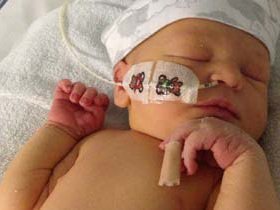This information covers feeding babies who are in the first year of life.
Normal stages of feeding
All babies need to go through stages of feeding – starting with taking milk (usually breast milk, but sometimes a formula is used), and then weaning, or starting to eat solids, often starting with pureed (mashed up) foods, and then on to lumpy and finger foods, before moving on to family foods.
There are key ‘windows’ of time when a baby can start weaning. The following is normally recommended for healthy babies:
- about 6 months – start eating pureed (mashed up) foods
- about 8 or 9 months and after they have mastered pureed foods – start eating lumpy foods.
Monitoring feeding and weight gain
Your healthcare team will check that baby is getting enough milk to meet his or her needs. They will weigh your baby at each appointment, or as regularly as needed.
If your baby’s weight gain is slow, your dietitian may make formula milk more concentrated so it is higher in energy. If there are concerns about your baby’s feeding, it may be helpful to keep a diary. You can include:
- the date
- the type of milk (breast milk or formula)
- the amount of milk your baby has taken
- any comments – including whether your baby is well, or has reflux or is vomiting.
Milk
Breast milk is best for most babies.
However, some babies with CKD need a special renal formula milk as the kidneys become less able to clean blood.
If your baby needs this, your renal dietitian will design a recipe especially for him or her, and show you how to make this up at home. This recipe will change as your baby’s needs change – your dietitian will check this regularly. You may need to:
- give this renal formula milk on its own
- mix it with breast milk – you will need to express your breast milk with a pump, or
- mix it with standard formula.

Weaning
CKD does not change the time of weaning. Solids provide extra energy. It is usual to introduce solids when babies are about six months of age. In some cases, the dietitian may encourage it after four months. Babies should not be weaned before four months of age.
Tips for weaning
Start with smooth pureed food.
Your baby may not swallow the food at first. New experiences of taste and a variety of flavours and textures are just as important as quantity. Don’t worry if your baby does not eat much – just work on his or her acceptance of tastes.
Let your baby be independent, get messy and really enjoy the feeding experience, regardless of what actually reaches the stomach.
Encourage progress with lumpy textures if you can. It is important your baby develops chewing skills at this stage. This will help him or her to develop tongue and jaw movement and speech. All babies gag on lumps from time to time. Don’t see this as a sign that your baby is trying to be sick. Try again, perhaps just giving the lumpier texture for a few mouthfuls. Try the same approach with finger foods.
- More information about weaning to solid food is available on the NHS Choices website.
- Read about weaning and how to introduce solid food on the NHS Start for Life website.
Special diets for older babies
Some babies with CKD need a special diet as well as special formula milk. This is usually only needed for babies who are eating a significant amount of food (more than a few tastes or spoonfuls). If your baby needs a special diet, the dietitian will give you advice on which foods to choose or avoid.
It is very important not to add salt to any baby’s food. Ready-made or convenience meals often have a lot of salt. Speak with your dietitian before giving these foods to your child.